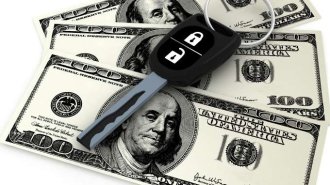
If you decided to enjoy all the advantages of a lease and have developed an attachment to your leased vehicle, you may be thinking about a car lease buyout. With plenty of car loan options available, the prospect of snagging a great car loan rate from an auto loan lender and purchasing your leased vehicle can be tempting. Since you've already made monthly payments that will be applied towards the cost of the car should you buy it out, a lease buyout can seem like a great car loan value. Before you buy, though, read on to find out if taking a lease buyout car loan to purchase your leased vehicle is really a good idea.
See the latest car lease deals >>
What Is a Car Lease Buyout?
A lease buyout of a car is when the leasing customer decides to buy the car at or near the end of their lease. Most leases allow this, and it can be a good idea, depending on the buyout term. Many customers will need to take out a loan from another lender to complete the buyout, which basically becomes a variation of a car loan.
As with any transaction, it's a good idea to weigh your purchase options when it comes to the buyout. Does the buyout make economic sense? Are you getting a good deal? A smart strategy is to let the lender contact you about a buyout, instead of the other way around. Let a leasing agent become a motivated seller, instead of giving the lender the impression you're a motivated buyer.
There are two types of lease buyouts: a lease-end buyout in which you purchase your car at the end of the leasing period and an early buyout in which you decide to purchase the car before the leasing period ends.
The Lease-end Buyout
This is the more common lease buyout, and tends to be a better deal for you than an early buyout. With a lease-end buyout, since you have already paid for the depreciation of the vehicle, you will be expected to pay the residual value which was originally stated in the lease agreement. This is usually a fair deal for all involved, but it's not as simple as that.
First, you should consider what you would pay for exactly the same vehicle from a used car dealer. If it is significantly different from the projected residual value of your leased vehicle, the price should be adjusted accordingly. Also be aware that you might be able to get a very good deal on a lease-end buyout because the dealer would have to spend a lot of time and money to get the car ready for resale, or else sell it at a wholesale auction. See if you can negotiate the purchase price down because of this.
The Early Buyout
An early buyout is more complicated than a lease-end buyout and is generally not a good idea. If your vehicle has been depreciating faster than projected, you'll be expected to pay for the difference. The process of calculating the price of an early buyout is complicated and can be done by your leasing dealership. At that point, you can decide if the price they ask is fair for the vehicle; however it is almost always a better deal for you to wait until the lease term is over and get a lease-end buyout.
Buying out a lease can be done to escape fees incurred by going over your yearly mileage allowance, but usually should not be done for this reason as you will likely end up paying more in additional depreciation fees. A better reason to take a loan out and buy out a lease is to keep a car that you love for a fair price or a great negotiated deal. Getting a loan to buy out a lease is the same as taking out a loan to pay for any other vehicle. Whether or not the loan is worth it is up to you, but hopefully this guide has presented you with the information you need to make that decision.
Car Loan Requirements for Lease Buyout Loans
Lease buyout loans are similar to used vehicle loans, but there are some unique requirements, which are highlighted below.